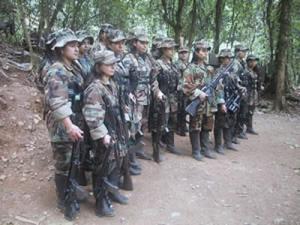ColombiaA faction of Colombian FARC rebel group rejects peace deal, refuses to disarm
The Armando Rios First Front, a unit of Colombia’s FARC rebel group, has said it will not disarm or demobilize, as it is required to do under the peace deal reached between the FARC and the government of Colombia. The deal, which ends the 52-year guerrilla war between the FARC and successive Colombian governments, was signed in Havana, Cuba, three weeks ago. The announcement by the First Front is the first public sign of opposition to the from within the rebel ranks. Colombian government sources said that other FARC factions could also reject the peace agreement, and that if enough of them did so, it would throw the peace process into doubt.

FARC guerillas during previous peace negotiations // Source: commons.wikimedia.org
The Armando Rios First Front, a unit of Colombia’s FARC rebel group, has said it will not disarm or demobilize, as it is required to do under the peace deal reached between the FARC and the government of Colombia. The deal, which ends the 52-year guerrilla war between the FARC and successive Colombian governments, was signed in Havana, Cuba, three weeks ago. Conservative factions in Colombia, led by former president Alvaro Uribe, are actively campaigning against the peace deal, which must be ratified in a referendum, but the announcement by the First Front is the first public sign of opposition to the from within the rebel ranks.
Time reports that the opposition to the deal – Conservative politicians argue that President Juan Manuel Santos has made too many concessions to the Marxist insurgents, while the hardened First Front accuse the FARC leadership of making too many concessions — may yet derail the 4-year effort to end the longest war in Latin America.
The First Front operates in the south-eastern jungle province of Guaviare.
“We have decided not to demobilize, we will continue the fight for the taking of power by the people for the people, independent of the decision taken by the rest of the members of the organization,” the unit said last week
The First Front, which held former presidential candidate Ingrid Betancourt and three American contractors hostage for several years, said the deal reached in Havana would not solve the social and economic problems which first motivated the Marxist group to take up arms in 1964.
President Santos has said the final points of the peace deal will be ironed out by the end of the month.
About 220,000 have been killed in the 52-year war, and 6.6 million people have been made internal refugees. Colombia has the largest number of internally displaced people in the world.
The First Front, which has had a working relationship with the Colombian drug cartels, said it would respect FARC rebels who agreed to peace, but called on other FARC units to join forces to continue the fight.
“We invite all guerrillas and militia who are not in agreement with demobilization and the laying down of FARC weapons to join forces and continue united as an organization,” the First Front’s statement said.
Santos, for his part, minced no words in telling FARC followers what awaits them if they did not adhere to the peace agreement.
“Anyone with doubts, best leave them aside and join the peace accord, because it’s the last opportunity they will have to change their lives, because otherwise they will end up, I assure you, in a grave or jail,” Santos said.
Colombian government sources said that other FARC factions could also reject the peace agreement, and that if enough of them did so, it would throw the peace process into doubt.
